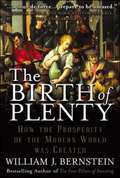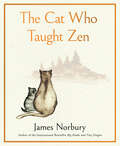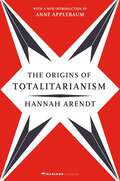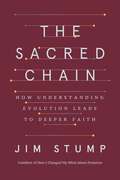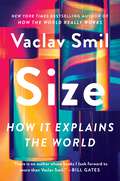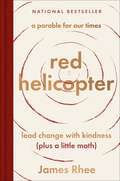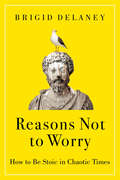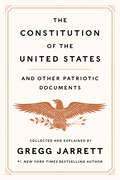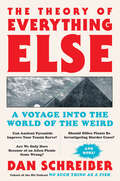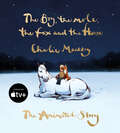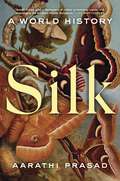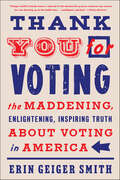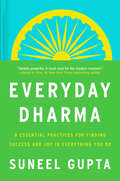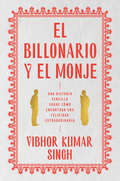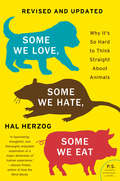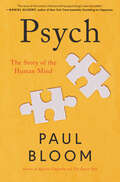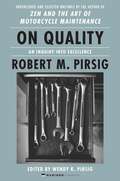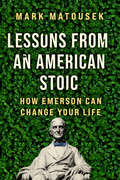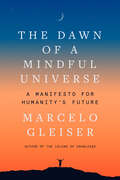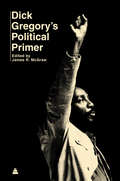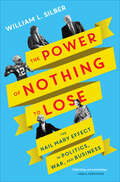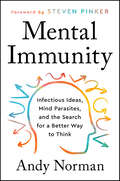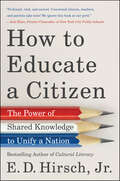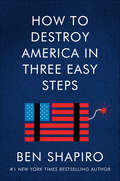- Table View
- List View
The Birth of Plenty: How the Prosperity of the Modern World Was Created
by William J. BernsteinA compact and immensely readable economic, political, military, and institutional history of our civilization that is a tour de force.
The Cat Who Taught Zen EBP
by James NorburyFrom the author and illustrator of the international bestseller Big Panda and Tiny Dragon comes a beautifully illustrated exploration into the journeys we take for self-discovery and the connections we make along the way.In a distant city, an old cat considers himself as wise as can be, until he hears of an ancient pine far away, under the boughs of which infinite wisdom can be found. Thus, the Cat embarks on a journey deep into the forest to search for the tree. Along the way, he meets new friends—the Hare, the Magpie, the Wolf Cub, the Monkey, the Tortoise, and the Tiger—and comes across the energetic young Kitten. What wisdom does the Cat have to impart to his friends, and, perhaps more importantly, what does he still have to learn?Inspired by Zen koans, with stunning illustrations and a gentle voice, The Cat Who Taught Zen has wisdom to offer all readers.
The Origins of Totalitarianism: with a new introduction by Anne Applebaum
by Hannah ArendtHannah Arendt’s definitive work on totalitarianism—an essential component of any study of twentieth-century political history—now with a new introduction by Anne Applebaum.In recent years, The Origins of Totalitarianism has become essential reading as we grapple with the rise of autocrats and tyrannical thought across the globe.The book begins with the rise of anti-Semitism in central and western Europe in the 1800s and continues with an examination of European colonial imperialism from 1884 to the outbreak of World War I.Hannah Arendt then explores the institutions and operations of totalitarian movements, focusing on the two genuine forms of totalitarian government in our time, Nazi Germany and Stalinist Russia, which she adroitly recognizes were two sides of the same coin, rather than opposing philosophies of Right and Left. From this vantage point, she discusses the evolution of classes into masses, the role of propaganda in dealing with the nontotalitarian world, the use of terror, and the nature of isolation and loneliness as preconditions for total domination.This edition includes an introduction by Anne Applebaum—a leading voice on authoritarianism and Russian history—who fears that “once again, we are living in a world that Arendt would recognize.”
The Sacred Chain: How Understanding Evolution Leads to Deeper Faith
by Jim StumpA thought-provoking and eye-opening work by Jim Stump, Vice President at BioLogos and host of the Language of God podcast, offering a compelling argument about how evolution does not have to be at odds with faith, but can actually enrich and deepen it.In this moving and deeply thoughtful book, Jim Stump takes readers with him on his journey to understanding evolution and reconciling it with his faith. The Sacred Chain draws on philosophy, theology, and the latest scientific research to tackle some of the biggest questions facing humanity and people of faith today, such as:How can we hold the Bible as a sacred text and yet reconcile modern science with it?By condensing noteworthy events in the history of our universe into one calendar week, what can we learn about God’s creative process and priorities, and where humans fit in?If humans are created in the image of God, what does evolution have to teach us about our species and our place in creation?What about the soul? How can we understand our transcendent qualities if the human body is the product of evolution?How does evolutionary science help us understand how God might use pain and suffering for important and good purposes?Does it have to be one or the other—science or religion—or is there a third way, one that not only preserves faith in the face of modern science, but leads to a stronger, more relevant, and more authentic faith?Deeply researched and a delight to read, The Sacred Chain provides clarity in our uncertain times, revealing a bigger picture of our world and our place within it. It is a panorama consistent with the scientific findings about who we are and where we come from that can actually bolster our faith as it engages our curiosity about ourselves, our universe, and the nature of existence itself.
Size: How It Explains the World
by Vaclav SmilFrom the New York Times bestselling author of How the World Really Works, a wide-ranging look at the most fundamental governing principle of our world: size, whose laws, limits, and peculiarities offer the key to understanding health, wealth, and even happiness“No one writes about the great issues of our time with more rigor or erudition than Vaclav Smil.” — Elizabeth KolbertTo answer the most important questions of our age, we must understand size. Neither bacteria nor empires are immune to its laws. Measuring it is challenging, especially where complex systems like economies are concerned, yet mastering it offers rich rewards: the rise of the West, for example, was a direct result of ever more accurate and standardized measurements.Using the interdisciplinary approach that has won him a wide readership, Smil draws upon history, earth science, psychology, art, and more to offer fresh insight into some of our biggest challenges, including income inequality, the spread of infectious disease, and the uneven impacts of climate change. Size explains the regularities—and peculiarities—of the key processes shaping life (from microbes to whales), the Earth (from asteroids to volcanic eruptions), technical advances (from architecture to transportation), and societies and economies (from cities to wages). This book about the big and the small, and the relationship between them, answers the big and small questions of human existence:What makes a human society too big? What about a human being?Which alternative energy sources have the best chance of scaling and reducing our dependence on fossil fuels?Why do tall people make more money?What makes a face beautiful? How about a cathedral?How can changing the size of your plates help you lose weight?The latest masterwork of “an ambitious and astonishing polymath who swings for fences” (Wired) Size is a mind-bending journey that turns the modern world on its head.
red helicopter—a parable for our times: lead change with kindness (plus a little math)
by James RheeA NATIONAL BESTSELLEREmbrace your agency, lead change, and fly free—in the business of life and the life of business—with kindness (plus a little math)In kindergarten, James Rhee received a toy red helicopter in gratitude for a simple act of generosity—sharing his lunch. Decades later, the lesson from that small gift led him to develop a human-centered framework for business and personal achievement that helped him overcome seemingly insurmountable hurdles and find unprecedented success.“red helicopter is a transformative experience. James Rhee's story is a must read for anyone, of any age, who wishes to think, act, and lead with balance, agility, and wisdom." —Jay ShettyRhee was a high school teacher turned private equity investor when he unexpectedly took the helm of Ashley Stewart, an iconic company predominantly employing and serving Black women. Inspired by the values his dying Korean immigrant parents instilled in him, he knew that a radically different—yet familiar—approach was required to lead this twice-bankrupt company from certain liquidation to true transcendence.Is it possible to be successful and kind? To lead with precision and compassion? To honor who we are in all areas of our lives?The entire world bet against him and Ashley, but Rhee trusted his instincts to identify, measure, and leverage the intangible goodwill at the company’s core, a decision which ultimately multiplied its fortunes several times over.Anyone can combine the clarity and imagination we had as children with fundamental business metrics. Anyone can apply this refreshingly intuitive approach to lead change at work and at home. While eloquently sharing a story of personal and professional success, red helicopter presents a comforting yet bold solution to the dissatisfaction and worry we all feel in a chaotic and sometimes terrifying world.The insights and knowledge that Rhee imparts have been accumulated over decades of investing and leading at the highest levels of business. Drawing on this experience, he encourages us to trust the wisdom deep inside each of us so we can learn how to:Create and measure “goodwill,” the ultimate collective goodDiscover agency and the truth about kindness it entailsIdentify the invisible obstacles standing in your wayLead transformational change through small, scalable actsConstruct an accurate “balance sheet” of our assets and liabilitiesReorient our lives, organizations, and the world to reflect the best in usAre you looking for a sustainable balance between life, money, and joy? For yourself and others?Imagine, a clear path forward told as a deeply felt human story. A poignant and uplifting celebration of humanity, red helicopter—a parable for our times is a tale of struggle and triumph, compelling for its honesty and relatability as much as for the instructions we can all use to balance the books of our lives.red helicopter—a parable for our times features approximately 20 original illustrations by Korean artist Heyon Cho.
Reasons Not to Worry: How to Be Stoic in Chaotic Times
by Brigid DelaneyIn this heartfelt and soul-searching work, brimming with warmth, humor, and insight, the beloved Guardian columnist spends a year exploring how to pursue a rich and meaningful life, turning to the wisdom of the Stoics for insights into the deepest questions of existence. Like many people today, Brigid Delaney was searching for answers to timeless questions: How can we be good? Find inner peace? Properly grieve? Tame our insecurities, such as the fear of missing out? Determine what truly matters?Centuries ago, the Stoics pondered many of these same questions. And so, at an important inflection point in her own life, Brigid decided to let these ancient philosophers be her guide. Brigid is rash where the Stoics are logical; she runs on chaos, while the Stoics relinquish control of things beyond their reach. Over the course of a year, she dedicated herself to following the wisdom of Seneca, Epictetus, and Marcus Aurelius. She hoped to discover how best to live—how she could use the wisdom of these ancient thinkers to navigate life in the modern world.In Reasons Not to Worry, Brigid shares what she learned, showing us how we, too, can draw on the Stoics to regain a sense of agency and tranquility and find meaning in our lives. From learning to relinquish control to cultivating daily awareness of our mortality to building community, Brigid’s insights are very funny and very wise.Stoicism can be a tough medicine to swallow, but no longer. Thoughtful, timely, surprisingly practical, and filled to the brim with ways to learn how best to be in the world, Delaney’s guide provides compelling and sensible reasons not to worry.
The Constitution of the United States and Other Patriotic Documents
by Gregg JarrettA collection of some of the most important documents and speeches that have shaped America, with commentary and insights from Fox News star and author of the #1 New York Times bestseller The Russia Hoax, Gregg Jarrett.In this volume, the Constitution and the Declaration of Independence are brought together with dozens of other historic documents and speeches which shaped the destiny of the United States of America. Also included are the Bill of Rights, the Federalist Papers, and the Articles of Confederation. Gregg Jarrett introduces and explains how each of these great documents created the America we know today.In addition to these Founding documents, this deluxe keepsake contains other legendary works from our nation’s history, including Frederick Douglass’s July 4th speech, Abraham Lincoln’s Second Inaugural Address, Martin Luther King Jr.’s “I Have a Dream” speech, and Ronald Reagan’s Berlin Wall speech.A tribute to the great minds and indelible words that have made America great, The Constitution of the United States and Other Patriotic Documents is essential for every patriot and anyone interested in knowing and understanding the course of American history.
The Theory of Everything Else: A Voyage Into the World of the Weird
by Dan Schreiber"Absorbing. ... As thoughtfully written as it is nuts." —Chicago TribuneA collection of the world’s most mind-boggling, thought-provoking, and downright hilarious theories by the co-host of the hit podcast No Such Thing as a Fish, Dan Schreiber.Why are we here? Do ghosts exist? Will we ever travel back in time? Are we being visited by extraterrestrials? Will we ever talk to animals? Are we being told the truth? Are mysterious creatures roaming the Earth? And why, when you’re in the shower, does the shower curtain always billow in towards you?We don’t know the answers to any of these questions (that includes the shower-curtain one, which is a mystery that has eluded scientists for decades, and which they are still trying to solve). But don’t worry, no matter what questions you have, you can bet on the fact that there is someone (or something) out there, investigating it on your behalf—and Dan Schreiber collects their latest findings.From the Silicon Valley tech billionaires currently trying to work out whether or not the universe is one giant video game simulation to the self-proclaimed community of Italian time-travelers who are trying to save the world from destruction; The Theory of Everything Else will act as a handbook for those who want to think differently.
The Boy, the Mole, the Fox and the Horse: The Animated Story
by Charlie MackesyA journey, in search of home Charlie Mackesy's beloved The Boy, the Mole, the Fox and the Horse has been adapted into an animated short film, coming to AppleTV this Christmas. This beautifully made book celebrates the work of over 100 animators across two years of production - with Charlie's distinctive illustrations brought to life in full colour with hand-drawn traditional animation and accompanying hand-written script."I made a film with some friends about a boy, a mole, a fox and a horse - their journey together and the boy's search for home. I hope this book gives you courage and makes you feel loved." Love Charlie x
Silk: A World History
by Aarathi PrasadA Next Big Idea Book Club Must-Read for April"Aarathi Prasad spins a masterpiece of a story, as luminous, supple, and surprising as the wondrous threads themselves." —Sy Montgomery, bestselling author of The Soul of an Octopus and Of Time and TurtlesThroughout history, across cultures and countries, silk has reigned as the undeniable queen of fabrics, yet its origins and evolution remain a mystery. In a gorgeous and sweeping narrative, Silk weaves together its intricate story and the indelible mark it has left on humanity.Some four thousand years ago, the cultivation of silkworms began, the practice spreading to the far reaches of civilization. With it came a growing obsession with unlocking silk’s secrets to understand how the strongest biological material ever known could be harnessed.Explorers and scientists, including groundbreaking women who pushed the boundaries of societal expectations, dedicated—even sacrificed—their lives to investigate the anatomy of silk-producing animals. They endured unbelievable hardships to discover and collect new specimens, leading them to the moths of China, Indonesia, and India; the spiders of Argentina, Paraguay, and Madagascar; and the mollusks of the Mediterranean.Rich with the complex connections between human and nonhuman worlds, Silk not only peers into the past but also reveals the fiber’s impact today, inspiring new technologies across the fashion, military, and medical fields, and shows its untapped potential to pioneer a more sustainable future.The culmination of author and biologist Aarathi Prasad’s own lifelong passion and grounded in years of research and writing, Silk is an intoxicating read that provides an essential illumination of nature’s most glamourous thread.
Thank You for Voting: The Maddening, Enlightening, Inspiring Truth About Voting in America
by Erin Geiger SmithIn this concise, lively look at the past, present, and future of voting, a journalist examines the long and continuing fight for voting equality, why so few Americans today vote, and innovative ways to educate and motivate them; included are checklists of what to do before election day to prepare to vote and encourage others.Voting is a prized American right and a topic of debate from the earliest days of the country. Yet in the 2016 presidential election, about 40 percent of Americans—and half of the country’s young adults—didn’t vote. Why do so many Americans choose not to vote, and what can we do about it? The problem, Erin Geiger Smith contends, is a lack of understanding about our electoral system and a need to make voting more accessible. Thank You for Voting is her eye-opening look at the voting process, starting with the Framers’ perspective, through the Equal Protection amendment and the Voting Rights Act, to the present and simple actions individuals can take to increase civic participation in local, state, and national elections.Geiger Smith expands our knowledge about our democracy—including women’s long fight to win the vote, attempts to suppress newly enfranchised voters' impact, state prohibitions against felons voting, charges of voter fraud and voter suppression, and other vital issues. In a conversational tone, she explains topics that can confuse even the most informed voters: polling, news literacy, gerrymandering and the Electoral College. She also explores how age, race, and socioeconomic factors influence turnout.Ultimately, Thank You for Voting offers hope. Geiger Smith challenges corporations to promote voting, and offers examples of how companies like Patagonia and Walmart have taken up the task in a non-partisan way. And she reveals how get-out-the-vote movements—such as television star Yara Shahidi’s voting organization, Michelle Obama’s When We All Vote campaign, and on-the-ground young activists—innovatively use technology and grassroots techniques to energize first-time voters.
Everyday Dharma: 8 Essential Practices for Finding Success and Joy in Everything You Do
by Suneel GuptaFind your dharma—your inner calling—and learn to integrate ambition, work, and wellbeing to create a balanced, joyous life with this practical, life-changing guide from the beloved speaker, bestselling author, and co-founder of the Gross National Happiness Center. We’ve been conditioned, from an early age, to believe that one day we’ll reach a moment of “arrival.” But no matter how much we achieve or acquire we still don’t feel as satisfied or as fulfilled as we thought we would be. Exhausted, we become burned out and cynical, questioning the purpose of it all.An expert on happiness and work, Suneel Gupta argues that for too long society has been fixated on the Future of Work and ignored the Future of Worth. We’ve compartmentalized work and well-being and ignored the fact that both are essential for sustained success. We’ve assumed that outer success leads to inner well-being–despite history showing us that this has never been the case.In Everyday Dharma, Suneel helps us break this negative cycle. A captivating storyteller, he weaves personal stories, history, science, Eastern philosophy, and Western modalities in this engaging, enlightening, and prescriptive book. He begins by helping us identify our dharma, the essence of who we are. When you’re in your Dharma, you feel confident, creative, and caring, with a sense of purpose, and that shines through your life and work.Everyday Dharma provides an accessible three-step approach to discovering, understanding, and living your “sacred calling.” At its center are self-assessments to help you identify your passions and powerful rituals for building new habits—ancient practices supported by science and found in diverse cultural sources, including Toni Morrison’s novels, Jimi Hendrix’s lyrics, and Frida Kahlo’s paintings, and used by the likes of Nelson Mandela, Dr. Martin Luther King, and Mahatma Gandhi.Finding your dharma empowers you to let go of anxiety, follow your wildest ambitions, produce your life’s work, and experience true joy.
Billionaire and the Monk, The \ El Billonario y el Monje (Spanish edition): Una historia sencilla sobre cómo encontrar una felicidad extraordiaria
by Vibhor Kumar SinghLa mayor sabiduría se encuentra a menudo en el conocimiento más simple.¿Qué pasa si aprende que todo lo que le han enseñado sobre la felicidad es falso? ¿Qué pasa si te das cuenta de que la felicidad no es una meta y, por lo tanto, no se puede lograr? ¿Qué pasa si descubre que es el camino ordinario el que conduce a un tesoro extraordinario?Esta es una historia sobre cómo dos hombres de diferentes ámbitos de la vida aprenden que no se requieren ropas de honor ni la renuncia total a la vida mundana para disfrutar del ser humano más fundamental: la felicidad.Es una historia sobre la comprensión de que la felicidad no es un enigma filosófico, sino un estado mental alcanzable y cómo uno puede apreciar las mayores alegrías a través de los actos más simples y pequeños de la vida diaria.Permítanos simplificar la felicidad y encontrar la respuesta extraordinaria a la pregunta ordinaria: ¿eres feliz?
Some We Love, Some We Hate, Some We Eat [Second Edition]: Why It's So Hard to Think Straight About Animals
by Hal HerzogA maverick scientist who co-founded the field of anthrozoology offers a controversial, thought-provoking, and unprecedented exploration of the psychology behind the inconsistent and often paradoxical ways we think, feel, and behave towards animals. How do we reconcile our love for cats and dogs (and rabbits, snakes, hamsters, gerbils, and goldfish) with our appetite for hamburgers and chicken breast and our use of medications that have been tested on lab mice? Why do so many of us—as meat eaters, recreational hunters and fishermen, and visitors of zoos and circuses—take the moral high ground when it comes to condemning activities like cockfighting? And why are dogs considered pets in America but dinner in Korea? With Some We Love, Some We Hate, Some We Eat, Hal Herzog offers a lively and deeply intelligent look inside our complex and often paradoxical relationships with animals. Drawing on over two decades of research in the interdisciplinary field of anthrozoology, the science of human-animal relations, Herzog examines the moral and ethical decisions we all face when it comes to the furry and feathered creatures with whom we share this planet. Alternately poignant and laugh-out-loud funny, Some We Love, Some We Hate, Some We Eat takes readers on a highly entertaining and illuminating journey through the full spectrum of human-animal relations, relating Dr. Herzog’s groundbreaking research on animal rights activists, cockfighters, professional dog show handlers, veterinary students, biomedical researchers, and circus animal trainers. Through psychology, history, biology, sociology, cross-cultural analysis, current animal rights debates, and the morality and ethics surrounding the use and abuse of animals, Herzog carefully crafts a seamless narrative composed of real life anecdotes, academic and scientific research, cross-cultural examples, and his own sense of moral confusion. Combining the intellectual rigor of Michael Pollan’s The Omnivore’s Dilemma with the wry observation of Bill Bryson’s A Walk in the Woods, Herzog offers a refreshing new perspective on our lives with animals—one that will forever change the way we look at our relationships with other creatures and, in so doing, will also change the way we look at ourselves.
Psych: The Story of the Human Mind
by Paul BloomA Next Big Idea Club Must-ReadA compelling and accessible new perspective on the modern science of psychology, based on one of Yale’s most popular courses of all timeHow does the brain—a three-pound wrinkly mass—give rise to intelligence and conscious experience? Was Freud right that we are all plagued by forbidden sexual desires? What is the function of emotions such as disgust, gratitude, and shame? Renowned psychologist Paul Bloom answers these questions and many more in Psych, his riveting new book about the science of the mind.Psych is an expert and passionate guide to the most intimate aspects of our nature, serving up the equivalent of a serious university course while being funny, engaging, and full of memorable anecdotes. But Psych is much more than a comprehensive overview of the field of psychology. Bloom reveals what psychology can tell us about the most pressing moral and political issues of our time—including belief in conspiracy theories, the role of genes in explaining human differences, and the nature of prejudice and hatred.Bloom also shows how psychology can give us practical insights into important issues—from the treatment of mental illnesses such as depression and anxiety to the best way to lead happy and fulfilling lives. Psych is an engrossing guide to the most important topic there is: it is the story of us.
What's Alive? (Let's-Read-and-Find-Out Science 1)
by Kathleen Weidner ZoehfeldRead and find out about what makes something alive, and what all living things need to stay healthy, in this colorfully illustrated nonfiction picture book.A person and a cat have something in common: You are both alive. People and plants and animals are all alive, but is a doll alive? Or your bike? How can you tell?This is a clear and appealing science book for early elementary age kids, both at home and in the classroom. It's a Level 1 Let's-Read-and-Find-Out, which means the book explores introductory concepts perfect for children in the primary grades. The 100+ titles in this leading nonfiction series are:hands-on and visualacclaimed and trustedgreat for classroomsTop 10 reasons to love LRFOs:Entertain and educate at the same timeHave appealing, child-centered topicsDevelopmentally appropriate for emerging readersFocused; answering questions instead of using survey approachEmploy engaging picture book quality illustrationsUse simple charts and graphics to improve visual literacy skillsFeature hands-on activities to engage young scientistsMeet national science education standardsWritten/illustrated by award-winning authors/illustrators & vetted by an expert in the fieldOver 130 titles in print, meeting a wide range of kids' scientific interestsBooks in this series support the Common Core Learning Standards, Next Generation Science Standards, and the Science, Technology, Engineering, and Math (STEM) standards. Let's-Read-and-Find-Out is the winner of the American Association for the Advancement of Science/Subaru Science Books & Films Prize for Outstanding Science Series.
On Quality: An Inquiry into Excellence: Unpublished and Selected Writings
by Robert M Pirsig Wendy K. PirsigFeaturing long-awaited selections from Robert M. Pirsig's unpublished writings, from before and after Zen and the Art of Motorcycle Maintenance, an original collection illuminating the central theme of Pirsig's thought: “Quality”“The ultimate goal in the pursuit of excellence is enlightenment." —Robert M. Pirsig, 1962More than a decade before the release of the book that would make him famous, Robert M. Pirsig had already caught hold of the central theme that would animate Zen and the Art of Motorcycle Maintenance: “Quality,” a concept loosely likened to “excellence,” “rightness,” or “fitness” that Pirsig saw as kindred to the Buddhist ideas of “dharma” or the “Tao.” As he later wrote in Zen, “Quality is the Buddha.”Though he was revered by fans who considered him a guru, the famously private Pirsig published only two books and consented to few interviews and almost no public appearances in later decades. Yet he wrote and thought almost continually, refining his “Metaphysics of Quality” until his death in 2017.Now, for the first time, readers will be granted access to five decades of Pirsig’s personal writings in this posthumous collection that illuminates the evolution of his thinking to an unprecedented degree. Skillfully edited and introduced by Wendy K. Pirsig, Robert’s wife of four decades, the collection includes previously unpublished texts, speeches, letters, interviews, and private notes, as well as key excerpts from Zen and the Art of the Motorcycle Maintenance and his second book, Lila.Since its publication in 1974, Zen and the Art of Motorcycle Maintenance has established itself as a modern classic of popular philosophy; selling millions of copies and inspiring a generation, while serving as a perennial touchstone for the generations that follow. On Quality is a remarkable contribution to our understanding of one of the most influential thinkers and writers of our time.
Lessons from an American Stoic: How Emerson Can Change Your Life
by Mark MatousekA lifelong Emerson lover, teacher, and spiritual seeker reveals how American philosopher Ralph Waldo Emerson’s twelve essential teachings hold the answer to living an authentic and fulfilling life, one that is in harmony with our souls.Ralph Waldo Emerson was a spiritual revolutionary whose profound vision of human potential came to define the American character. Known as America’s original Stoic, he offered a radical message of optimism, authenticity, and self-realization that is more necessary today than ever.In this timely, remarkable book, noted memoirist and teacher Mark Matousek reveals the depths of Emerson’s extraordinary wisdom, demonstrating how his timeless philosophy can help us navigate the challenges of contemporary life. Using personal stories, psychological research, and life lessons from Emerson and his contemporaries—including Thoreau and Whitman— he offers practical lessons in the art of living. In the following pages, you will discover:Why Emerson should be considered America’s original stoicHow to dispel the illusion of our own powerlessness and turn toward boundless human potentialPractical tools for cultivating happiness in a fragile, unpredictable, dangerous worldThe gifts of self-reliance and spiritual renewal necessary for thrivingA roadmap to discovering essential wisdom on living an authentic and meaningful lifeEmerson’s far-reaching vision of excellence and spiritual flourishing is the medicine we need to heal ourselves. “Trust yourself,” he teaches. “Once you make a decision, the universe conspires to make it happen.” This philosophy of hope, known as transcendentalism, is the vein of gold in the American psyche. Lessons from an American Stoic helps us to reclaim our national treasure.
The Dawn of a Mindful Universe: A Manifesto for Humanity's Future
by Marcelo GleiserAn award-winning astronomer and physicist’s spellbinding and urgent call for a new Enlightenment and the recognition of the preciousness of life using reason and curiosity—the foundations of science—to study, nurture, and ultimately preserve humanity as we face the existential crisis of climate change. Since Copernicus, humanity has increasingly seen itself as adrift, an insignificant speck within a large, cold universe. Brazilian physicist, astronomer, and winner of the 2019 Templeton Prize Marcelo Gleiser argues that it is because we have lost the spark of the Enlightenment that has guided human development over the past several centuries. While some scientific efforts have been made to overcome this increasingly bleak perspective—the ongoing search for life on other planets, the recent idea of the multiverse—they have not been enough to overcome the core problem: we’ve lost our moral mission and compassionate focus in our scientific endeavors.Gleiser argues that we’re using the wrong paradigm to relate to the universe and our position in it. In this deeply researched and beautifully rendered book, he calls for us to embrace a new life-centric perspective, one which recognizes just how rare and precious life is and why it should be our mission to preserve and nurture it. The Dawn of a Mindful Universe addresses the current environmental and scientific impasses and how the scientific community can find solutions to them.Gleiser’s paradigm rethinks the ideals of the Enlightenment, and proposes a new direction for humanity, one driven by human reason and curiosity whose purpose is to save civilization itself. Within this model, we can once again see ourselves as the center of the universe—the place where life becomes conscious—and regain a clear moral compass which can be used to guide both science and the politics around it.
Dick Gregory's Political Primer
by Dick Gregory James R. McGrawA unique and timeless guide to American government and its electoral process—as relevant today as when it was first published in 1972—from the voice of black consciousness, cultural icon Dick Gregory, the incomparable satirist, human rights and environmental activist, health advocate, social justice champion, and author of the NAACP Image Award–winning Defining Moments in Black History: Reading Between the Lies and the classic bestseller Nigger: An Autobiography.For most of his life, Richard Claxton “Dick” Gregory worked to educate Americans about the issues—and the forces of power—shaping their lives. A brilliant and informed student of the American experiment, he viewed and understood politics with an acuity few possess. Nearly fifty years ago, on the eve of Richard M. Nixon’s reelection, he wrote a classic guide to the American political system for ordinary folks. Today, when American democracy is threatened, his primer is more necessary than ever before. In Dick Gregory’s Political Primer, Gregory presents a series of lessons accompanied by review questions to educate and empower every citizen. He provides amusing, concise, and clear information and commentary on the nature of political parties, the three branches of government and how they operate, how the campaign process works and the costs, and more. Gregory offers imaginative comparisons such as the Hueys—Long, the populist Louisiana governor and Newton, the cofounder of the Black Panthers—and numerological parallels between Abraham Lincoln and John F. Kennedy. He also includes a trenchant glossary that offers insights into some of the major players, terms, and institutions integral to our democracy and government. An essential guide to American history unlike any other, Dick Gregory’s Political Primer joins the ranks of classics such as Howard Zinn’s A People’s History of the United States, and is essential reading for every American.
The Power of Nothing to Lose: The Hail Mary Effect in Politics, War, and Business
by William L. Silber"Silber is a charming narrator, and the stories in this book range from the Montgomery bus boycott to the mating habits of spiders to the sinking of the Lusitania. The insight linking these episodes is both simple and profound: when people (or spiders) have nothing to lose, caution deserts them. Refugees seeking asylum, presidents facing term limits, patients with terminal illnesses, Adolf Hitler in December 1944: all illustrate how desperate people will rationally gamble for redemption. Read Silber for the pleasure of his prose. But also read him for his wisdom." — Sebastian Mallaby, Senior Fellow at the Council on Foreign Relations, and author of More Money Than God: Hedge Funds and the Making of a New Elite"Silber has a great eye for forces that have driven important decisions in history. This book weaves together gripping accounts of risky behavior by politicians, generals, and business leaders, and how they impacted society in surprising ways. I couldn't put this book down." — Thomas J. Sargent, Nobel Laureate in Economics“Silber uses specific examples of how ‘the power of nothing to lose’ has benefited many people who have changed the course of history, from Rosa Parks to star athletes such as Venus Williams.” — Sofia Pitt, CNBC"A brisk look at times when it pays off to take a chance." — Kirkus Reviews"'As Bill Silber shows in this enthralling and entertaining book--which I devoured in a single sitting--all kinds of people through history have acted recklessly in the belief that they had nothing to lose, from second-term presidents pardoning crooked cronies to quarter-backs throwing Hail Mary passes. One of the world's most brilliant teachers of finance, Bill Silber knows that the best way to teach the tricky math of options-pricing is to wrap it in good yarns from sports, politics and history. The Power of Nothing to Lose brings together some of his best stories--and kindly omits the math." — Niall Ferguson, Milbank Family Senior Fellow, the Hoover Institution, and author of The Ascent of Money"What do Rosa Parks, Mohamed Atta, Aaron Rodgers, George Washington,and Adolf Hitler, have in common...Silber has the answer." — Keen On Podcast"Fascinating." — Tobias Carlisle, The Acquirers Podcast "[William L. Silber's] comments are pertinent in the present day of cryptocurrencies, the ‘retailization’ of options trading, NFTs, and meme stocks, among others." — The Contrarian Investor Podcast
Mental Immunity: Infectious Ideas, Mind-Parasites, and the Search for a Better Way to Think
by Andy NormanWhy do people reject science and believe online conspiracy theories? How are people radicalized online and go on to commit acts of violence? Why is our society so politically polarized?Astonishingly irrational ideas are spreading. Covid denial persists in the face of overwhelming evidence. Anti-vaxxers compromise public health. Conspiracy thinking hijacks minds and incites mob violence. Toxic partisanship is cleaving nations, and climate denial has pushed our planet to the brink. Meanwhile, American Nazis march openly in the streets, and Flat Earth theory is back. What the heck is going on? Why is all this happening, and why now? More important, what can we do about it? In Mental Immunity, Andy Norman shows that these phenomena share a root cause. We live in a time when the so-called “right to your opinion” is thought to trump our responsibilities. The resulting ethos effectively compromises mental immune systems, allowing “mind parasites” to overrun them. Conspiracy theories, evidence-defying ideologies, garden-variety bad ideas: these are all species of mind parasite, and each of them employs clever strategies to circumvent mental immune systems. In fact, some of them compromise cultural immune systems – the things societies do to prevent bad ideas from spreading. Norman shows why all of this is more than mere analogy: minds and cultures really do have immune systems, and they really can break down. Fortunately, they can also be built up: strengthened against ideological corruption. He calls for a rigorous science of mental immune health – what he calls “cognitive immunology” – and explains how it could revolutionize our capacity for critical thinking.Hailed as “a feast for thought,” Mental Immunity melds cutting-edge work in science and philosophy into an “astonishingly enlightening and productive” solution to the signature problem of our age. A practical guide to spotting and removing bad ideas, a stirring call to transcend our petty tribalisms, and a serious bid to bring humanity to its senses.
How to Educate a Citizen: The Power of Shared Knowledge to Unify a Nation
by E. D. Hirsch Jr.“Profound, vital and correct. Hirsch highlights the essence of our American being and the radical changes in education necessary to sustain that essence. Concerned citizens, teachers, and parents take note! We ignore this book at our peril."— Joel Klein, former Chancellor of New York City Public SchoolsIn this powerful manifesto, the bestselling author of Cultural Literacy addresses the failures of America’s early education system and its impact on our current national malaise, advocating for a shared knowledge curriculum students everywhere can be taught—an educational foundation that can help improve and strengthen America’s unity, identity, and democracy.In How to Educate a Citizen, E.D. Hirsch continues the conversation he began thirty years ago with his classic bestseller Cultural Literacy, urging America’s public schools, particularly at the elementary level, to educate our children more effectively to help heal and preserve the nation. Since the 1960s, our schools have been relying on “child-centered learning.” History, geography, science, civics, and other essential knowledge have been dumbed down by vacuous learning “techniques” and “values-based” curricula; indoctrinated by graduate schools of education, administrators and educators have believed they are teaching reading and critical thinking skills. Yet these cannot be taught in the absence of strong content, Hirsch argues.The consequence is a loss of shared knowledge that would enable us to work together, understand one another, and make coherent, informed decisions. A broken approach to school not only leaves our children under-prepared and erodes the American dream but also loosens the spiritual bonds and unity that hold the nation together. Drawing on early schoolmasters and educational reformers such as Noah Webster and Horace Mann, Hirsch charts the rise and fall of the American early education system and provides a blueprint for closing the national gap in knowledge, communications, and allegiance. Critical and compelling, How to Educate a Citizen galvanizes our schools to equip children with the power of shared knowledge.
How to Destroy America in Three Easy Steps
by Ben ShapiroA NEW YORK TIMES BESTSELLER!A growing number of Americans want to tear down what it’s taken us 250 years to build—and they’ll start by canceling our shared history, ideals, and culture.Traditional areas of civic agreement are vanishing. We can’t agree on what makes America special. We can’t even agree that America is special. We’re coming to the point that we can’t even agree what the word America itself means. “Disintegrationists” say we’re stronger together, but their assault on America’s history, philosophy, and culture will only tear us apart.Who are the disintegrationists? From Howard Zinn’s A People’s History of the United States to the New York Times’ 1619 project, many modern analyses view American history through the lens of competing oppressions, a racist and corrupt experiment from the very beginning. They see American philosophy as a lie – beautiful words pasted over a thoroughly rotted system. They see America’s culture of rights as a façade that merely reinforces traditional hierarchies of power, instead of being the only culture that guarantees freedom for individuals.Disintegrationist attacks on the values that built our nation are insidious because they replace each foundational belief, from the rights to free speech and self-defense to the importance of marriage and faith communities, with nothing more than an increased reliance on the government. This twisted disintegrationist vision replaces the traditional “unionist” understanding that all Americans are united in a shared striving toward the perfection of universal ideals.How to Destroy America in Three Easy Steps shows that to be a cohesive nation we have to uphold foundational truths about ourselves, our history, and reality itself—to be unionists instead of disintegrationists. Shapiro offers a vital warning that if we don’t recover these shared truths, our future—our union—as a great country is threatened with destruction.
